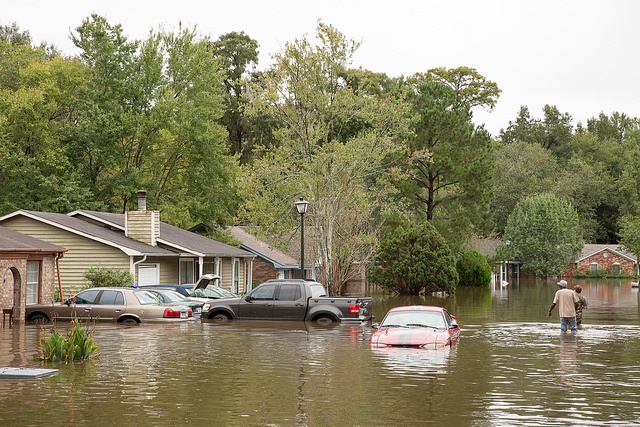Will historic SC floods wash away state leaders' climate science denial?

North Charleston was among the South Carolina communities hit hard by flooding from recent extreme rains, which scientists say are likely to become more common due to climate change. (Photo from the City of North Charleston via Flickr.)
South Carolina continues to assess the damage from the historic rains that fell between Friday and Monday and dumped as much as 20 inches of rain in some parts of the state. At least 16 people were killed and more than a dozen dams breached in the state so far, with the flooding causing an estimated $1 billion in damage. The flood threat is expected to last through the coming weekend as the water makes its way downstream.
During a Sunday press conference, Gov. Nikki Haley noted the rarity of such a rain event, which was caused by a stalled front that drew moisture from an offshore hurricane.
"We are at a 1,000-year level of rain," Haley said, referring to the 0.1 percent or 1-in-1,000 chance that a rainfall of such intensity will happen in a given year. "That's how big this is."
Unfortunately, such intense rains are happening far more frequently nowadays than once every millennium. Other recent 1-in-1,000 rain events took place in Tennessee in May 2010; across the Mid-Atlantic, Northeast and New England in 2011; in Colorado in 2013; in Baltimore in 2014; and earlier this year in Nebraska, as USA Today reports.
And of course, the trend toward extreme weather is affecting not only the United States: In the last few days alone, flooding has killed 19 people in southern France, a typhoon killed 11 people in China, and heavy rains caused a landslide in Guatemala that has left at least nine people dead and 600 missing, according to TckTckTck.org.
Tying a specific weather event to climate change is difficult. But scientists have long warned that a warming climate would lead to more extreme weather — including heavier rainfalls. The National Climate Assessment for the southeastern U.S. released last year noted that "the amount of rain falling in very heavy precipitation events [has] increased over recent decades, and further increases are projected.
"This is yet another example, like Sandy or Irene, of weather on ‘steroids', another case where climate change worsened the effects of an already extreme meteorological event," Michael Mann, a prominent climate scientist and director of Penn State's Earth System Science Center told The Guardian regarding the South Carolina flooding.
But even while South Carolina is already suffering the dire consequences of human-caused climate change, its leaders have proven reluctant to acknowledge the science behind what's happening.
According to a ThinkProgress report released earlier this year detailing governors' positions on climate change, Haley has never stated whether she believes climate change is real. But she's spoken out against federal efforts to curb greenhouse gas pollution, saying at one point that Washington needs to "stay out of the way."
Fossil fuel concerns including electric utilities and oil and gas interests have been major contributors to the governor's campaign, according to the National Institute on Money in State Politics. Haley has also been deeply involved in the effort to open the Atlantic to offshore oil and gas drilling.
At the same time, Haley's administration has tried to squelch discussion of climate change. Back in 2013, The State newspaper of Columbia obtained a copy of a report on global warming that the S.C. Department of Natural Resources under Haley had kept secret for more than a year due to political pressure. Agency officials said the report was not released because their "priorities" changed.
The disconnect between Haley's acknowledgement of the recent rains as extremely unusual and her administration's efforts to bury the truth about climate change impacts on her state did not go unnoticed on social media, where the governor was skewered for her position.
Perhaps the flooding affecting her state will lead her administration to re-evaluate its priorities.
Tags
Sue Sturgis
Sue is the former editorial director of Facing South and the Institute for Southern Studies.
